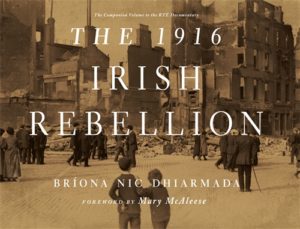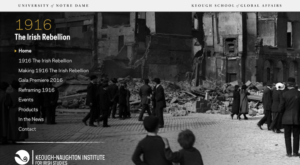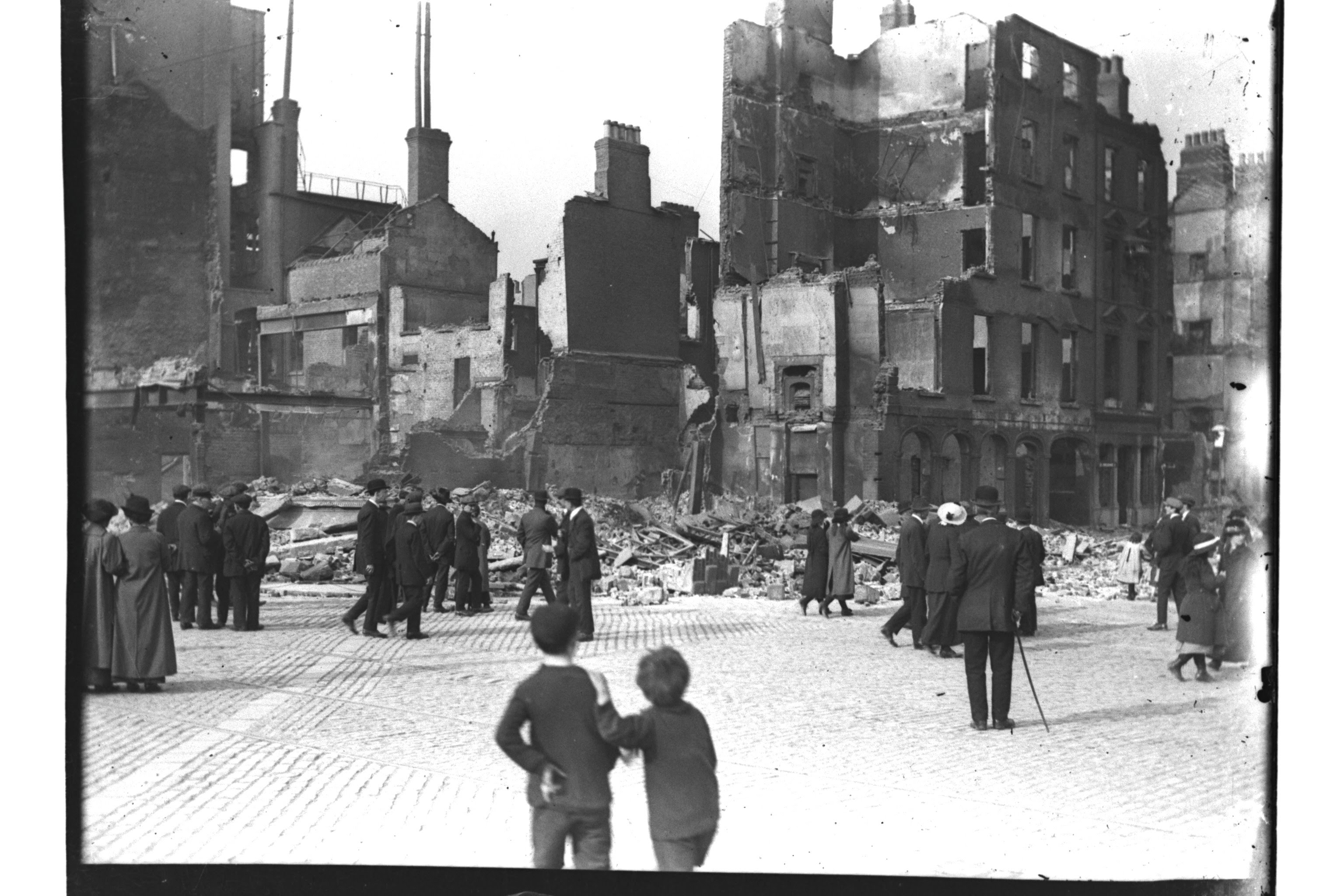
“You’re dealing with people, with people’s memories, with history and you’re dealing with people’s lives,”—Briona Nic Dhiarmada
With the centenary of the 1916 Rising on the horizon, Irish documentarist Pat Collins and Irish Studies professor Briona Nic Dhiarmada sought to commemorate the event in a way that had never been done before. Their goal was to reach a more global audience using “the unique talent, expertise and connections with scholars worldwide to tell this story in a way it has not been told.” The documentary follows the main organizers of the rebellion, Patrick Pearse, James Connolly, Tom Clarke, and others through historical accounts, primary sources, and narration by Liam Neeson (about whom Briona jokes is a “not very well-known actor, who we decided to give a chance”). With more sources and archives available than during the 50th anniversary, the centenary commemorations could paint a new picture under a new light: one that is more cohesive, comprehensive, and universal in its telling.
Background
As one could imagine for a project of this caliber, there were many moving parts and parties involved. An initiative of the Keough-Naughton Institute for Irish Studies at the University of Notre Dame, this documentary places the events of the Rising in their proper historical, political and cultural context as the dawn of an independent Irish state.

The creative team was lead by Briona Nic Dhiarmada and Christopher Fox of the Keough-Naughton Institute for Irish Studies at Notre Dame. Academic contributors were from all around the world, mostly based in the UK and United States. The Irish Government made the documentary the centerpiece of the commemoration, and was broadcast worldwide—even to 24 Irish embassies and consulates worldwide to reach the 70 million people of the Irish Diaspora. Leading universities and institutions worldwide hosted a series of international academic events entitled Reframing 1916 to include the world audience with the academic dialogue surrounding these events through panels, discussions, and screenings of the documentary.
It was important that most of the team be of Irish descent so as to make the story more personable while keeping a moderate approach across the board. The team is also from a global background, one that provides a universal perspective outside of the invested Irish heritage.
Implications of the Documentary
Although the Rising happened 100 years ago, there are still families and relatives alive related to the men and women of the Rising for whom the events are still very sensitive. Not to forget, as well, the freshness of The Troubles and the underlying tensions still remaining between the North and Republic of Ireland that made this documentary difficult to produce.
In an interview article from The Observer, Briona Nic Dhiarmada said:
“The fact that I’m based in the states, it’s emanating from the University of Notre Dame, which has a strong connection with Ireland. Particularly the Keough-Naughton Institute for Irish Studies — we’re a leader in Irish Studies. So we have this connection, this back and forth, and I think it’s that perspective that we’re able to look over back to Ireland, bring what we have over here over there and bring Ireland back to us.”
She is also aware of the personal nature of the story:
“People make history, but history makes and breaks people, so we’re conscious of a great responsibility, I suppose, and really what we tried to do was tell the story as honestly as possible, keeping in mind that one has to be ethical when you’re telling these stories and conscious of the effect it can have on people.”
It is important that Nic Dhiarmada and her team recognized this because of the sensitivity surrounding the subject. They were able to give the stories personal touches, backgrounds, and humanity. In doing so, they gave the story back to the people in a way that was not contentious or politically biased, one that sets up a discussion. Although not all the historians involved agree, they made for a more global and well-rounded perspective that made a story that told itself: “…really a story about the breakup of empires. I think that’s one of the reasons the film has the broad appeal it has.”
In an attempt to be unbiased, it is important that the documentary was produced in the United States. It allows for the experience to be more readily spread and experienced, without such pressure to tell a certain story, one that Ireland has been familiar with for a century. With Notre Dame producing the piece, a fresh set of eyes can approach the topic and also involve the world more readily without immediate criticisms from those at home in Ireland. What makes this piece special, though, is that it does not “canonize or demonize” the events or focus on the consequences within Ireland; not every rebel is a hero, and not every British is a “one-dimensional villain.” It is more of a fresh slate, unbiased approach, to educate and invigorate Irish around the world, while also resonating with those who stand for equality and freedom the world over.
Producing the film in America also made sense because of the readily available resources and significant parallels with American history. As Episode 3 of the documentary highlights, America and Ireland have significant parallels in their efforts for independence. Additionally, plenty of Irishmen and women had emigrated to America, including Eamon de Valera’s family. America was an inspiring country to many Irish men and women, used as a backdrop for their own movement. Globalization was widespread, so the documentary had to mimic this nature; Ireland was certainly not the only country resisting greater powers during the early and mid-1900s.
To watch Briona speak at the screening, click here:
For more of:
“Home // 1916 The Irish Rebellion // University of Notre Dame.” 1916 The Irish Rebellion, Keough School of Global Affairs, 1916.nd.edu/.
…http://1916.nd.edu/making-1916-the-irish-rebellion/partnerships/
Jaros, Madison. “Notre Dame Produces Documentary on 1916 Easter Rising BBC Documentary Films Irish Identity.” University WireApr 09, Carlsbad, 2015. https://proxy.geneseo.edu/login?url=http://proxy.geneseo.edu:2091/docview/1672328296?accountid=11072. http://ndsmcobserver.com/2015/04/notre-dame-produces-documentary-on-1916-easter-rising/
Schick, Jacob. “Historic Roots Unearthed in ‘1916: The Irish Rebellion’ Documentary.” University WireSep 28, Carlsbad, 2016.https://proxy.geneseo.edu/login?url=http://proxy.geneseo.edu:2091/docview/1824271384?accountid=11072. http://bcheights.com/arts-review/2016/historic-roots-unearthed-1916-irish-rebellion-documentary/

